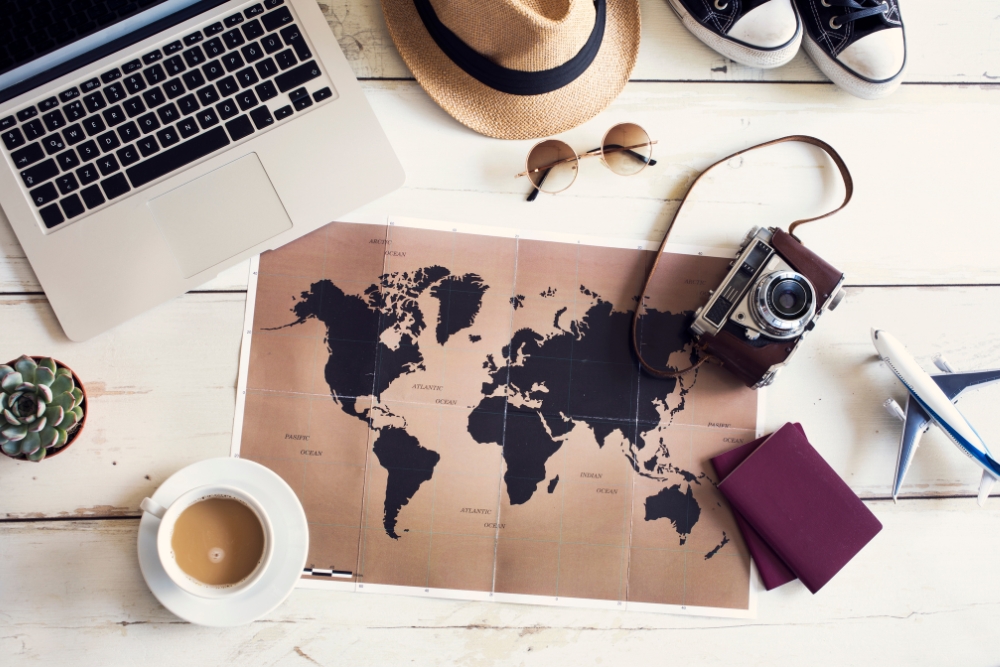Embarking on a journey to write captivating travel stories requires more than a passion for adventure; it demands thorough research. In “The Importance of Travel Research: How to Write Accurate Travel Stories,” you will uncover the key to crafting engaging narratives that transport your readers to new destinations. By delving into the art of effective travel research, you will learn how to find reliable sources, verify facts, and navigate potential pitfalls.
Importance of Travel Research

Why research is crucial for travel writing
Travel research is a vital component of writing accurate and engaging travel stories. By conducting thorough research, you can provide your readers with valuable information about a destination, enabling them to make informed decisions and have authentic experiences. Research allows you to delve into the history, culture, attractions, and local customs of a place, giving your readers a well-rounded and immersive experience through your writing.
How research enhances the accuracy of travel stories
Research plays a crucial role in enhancing the accuracy of travel stories. By immersing yourself in the research process, you gain a deeper understanding of the destination you are writing about. This understanding enables you to provide accurate and up-to-date information to your readers, ensuring that they can rely on your travel stories as a reliable source of information. Whether it’s factual data, historical context, or cultural nuances, research allows you to paint an accurate picture of a destination and its unique experiences.
Benefits of conducting thorough research
Conducting thorough research before writing a travel story offers numerous benefits. Firstly, it enables you to gather a vast amount of information that can help you write a well-informed and comprehensive article. This research allows you to uncover hidden gems, off-the-beaten-path attractions, and unique aspects of a destination that may not be commonly known. Additionally, research enhances your credibility as a travel writer, as it demonstrates your commitment to accuracy and your dedication to providing the best possible information to your readers. Overall, thorough research sets the foundation for an engaging and authentic travel story.
Finding Reliable Sources
Importance of credible sources in travel research
When conducting travel research, it is crucial to rely on credible sources. Credible sources provide accurate and trustworthy information, ensuring the reliability of your own travel writing. Utilizing credible sources enhances the credibility of your travel stories and ensures that your readers can trust the information you provide. By accessing reliable sources, you can confidently present accurate facts, statistics, and insights about a destination, contributing to a more comprehensive and informative travel story.
Websites for finding accurate travel information
The internet offers a vast array of websites that can be valuable resources for finding accurate travel information. Websites such as official tourism board websites, reputable travel blogs, and online forums can provide up-to-date insights, local recommendations, and personal experiences from fellow travelers. It is important to cross-reference information from multiple websites to ensure accuracy and reliability. Remember to critically evaluate the sources you use, paying attention to the expertise and credibility of the authors or organizations providing the information.
Books and guidebooks for in-depth research
Books and guidebooks can be excellent sources for in-depth research when writing travel stories. Written by expert authors with extensive knowledge and experience in travel, these publications offer comprehensive information about destinations, attractions, and cultural nuances. Guidebooks often provide detailed maps, recommended itineraries, and practical tips for travelers. While guidebooks may not always have the most current information, they can still be valuable resources for understanding a destination’s history, culture, and must-see attractions.
Interviewing locals for insider information
One of the most valuable sources of information for travel research is the locals themselves. Engaging in conversations and interviews with locals can provide unique insights, insider tips, and firsthand experiences that may not be available through other sources. Locals can offer recommendations for lesser-known attractions, hidden gems, and local customs that can greatly enrich your travel story. Additionally, interviewing locals allows you to include personal anecdotes and quotes in your writing, adding a human touch and authenticity to your travel stories.
Verifying Facts
Importance of fact-checking in travel writing
Fact-checking is a crucial step in ensuring the accuracy and reliability of your travel writing. By thoroughly fact-checking your information, you can confidently present accurate and up-to-date facts to your readers. This not only builds trust with your audience but also ensures that they can rely on your travel stories as a trustworthy source of information. Fact-checking is essential in avoiding misinformation, inaccuracies, and potential pitfalls that can harm your credibility as a travel writer.
Cross-referencing information from multiple sources
Cross-referencing information from multiple sources is a fundamental aspect of fact-checking in travel writing. By consulting multiple sources, you can verify the accuracy and reliability of the information you have gathered. This helps you to identify any discrepancies or inconsistencies, enabling you to present the most accurate and reliable information in your travel stories. Cross-referencing also allows you to gather a variety of perspectives and insights, enriching your writing and offering your readers a well-rounded portrayal of the destination.
Verifying statistics and data
Statistics and data play a significant role in travel writing, providing concrete evidence and context for your stories. It is essential to verify the accuracy of any statistics or data you include in your travel writing. This can be done by consulting official government websites, reputable research institutes, or academic sources. By ensuring the accuracy of statistics and data, you strengthen the credibility of your travel stories and provide your readers with reliable information they can trust.
Ensuring accuracy in historical and cultural information
When writing about the history and culture of a destination, it is crucial to ensure accuracy. Historical and cultural information adds depth and context to your travel stories, allowing readers to develop a deeper understanding of a place. To ensure accuracy, consult reputable historical sources, academic journals, or expert opinions in the field. Be attentive to historical details, cultural traditions, and societal norms, providing your readers with an authentic and respectful representation of the destination’s heritage.
Avoiding Common Pitfalls

Misrepresenting a destination
Misrepresenting a destination can have serious consequences for both the travelers and the local community. It is essential to approach travel writing with integrity and strive for accuracy in portraying a destination. Misrepresenting a place can result in disappointment or unrealistic expectations for travelers, while also impacting the reputation and cultural integrity of the local community. By conducting thorough research, fact-checking information, and seeking local insights, you can avoid misrepresentation and present an authentic account of a destination.
Overgeneralizing or stereotyping cultures
Cultural diversity is one of the most fascinating aspects of travel, and it is important to avoid overgeneralization or stereotypes when writing about different cultures. Every culture is unique and multifaceted, and generalizations can lead to misunderstandings and perpetuate stereotypes. By conducting research that focuses on understanding the nuances of a culture, engaging in thoughtful conversations, and seeking diverse perspectives, you can write more nuanced and accurate portrayals of different cultures in your travel stories.
Ignoring or misinterpreting local customs and traditions
Local customs and traditions are integral to the identity of a destination, and it is crucial to respect and accurately portray them in travel writing. Ignoring or misinterpreting local customs can create cultural misunderstandings and hinder meaningful interactions between travelers and locals. Conducting thorough research, including interviews with locals, and seeking guidance from reputable sources can ensure that you understand and represent local customs and traditions authentically, fostering cultural appreciation and respect.
Inaccurate portrayal of transportation and logistics
Transportation and logistics are practical aspects of travel that should be accurately portrayed in travel writing. Providing accurate information about transportation options, routes, schedules, and costs helps travelers plan their trips effectively and safely. Verify transportation details through official websites, reputable travel guides, or by consulting locals who are familiar with the transportation systems of the destination. Inaccurate information can lead to confusion, frustration, or even safety concerns for travelers, so it is essential to prioritize accuracy in this aspect of your travel stories.
Conducting Thorough Research
Identifying key aspects to research for each destination
When conducting travel research, it is important to identify the key aspects to focus on for each destination. This includes gathering information about the destination’s history, geography, culture, attractions, local customs, culinary traditions, transportation options, safety considerations, and more. Conducting comprehensive research allows you to provide a well-rounded and informative travel story that covers all the essential aspects of the destination.
Exploring the history and background of a place
A destination’s history and background provide the foundation for understanding its culture, traditions, and attractions. By exploring the history and background of a place, you gain valuable insights that can enrich your travel writing. Consult historical books, online archives, and local historical societies to gather accurate and intriguing historical information. Incorporate historical narratives and anecdotes into your travel stories, connecting the past with the present and providing readers with a deeper understanding of the destination.
Understanding the local culture and customs
Understanding the local culture and customs is essential for immersing yourself in a destination and presenting an authentic portrayal of the local way of life. By researching the cultural norms, traditions, and customs of a place, you can offer your readers a deeper understanding of the destination’s people and values. Explore cultural guides, anthropological studies, and consult local experts or individuals from the community to gain valuable insights into the cultural fabric of the destination. Incorporate these cultural nuances into your travel stories, adding depth and authenticity to your writing.
Researching popular attractions and off-the-beaten-path gems
Researching popular attractions and off-the-beaten-path gems allows you to provide a well-rounded perspective of a destination’s highlights. While popular attractions are often well-known, it is essential to gather accurate information about opening hours, ticket prices, and visitor guidelines. Additionally, delving into off-the-beaten-path gems enables you to uncover hidden treasures and lesser-known spots that can add a sense of discovery and adventure to your travel stories. By conducting thorough research, you can present a balanced mix of popular and lesser-known attractions, catering to a wide range of readers.
Organizing Research Notes

Effective note-taking techniques
Effective note-taking techniques are essential to stay organized and efficiently record the information you gather during the research process. Some techniques include creating a system of color-coded sticky notes, using digital note-taking apps, or utilizing a physical notebook. Whichever method you choose, ensure that your notes are clear, concise, and include essential details such as the source of the information, relevant quotes, and any personal insights or observations. Develop a note-taking system that works best for you and allows easy referencing when writing your travel stories.
Creating a research outline
Creating a research outline is a valuable step in organizing your research notes and streamlining the writing process. Start by outlining the main sections or themes you want to cover in your travel story, such as history, culture, attractions, and personal experiences. Within each section, break down the subtopics or key points you want to highlight. This outline serves as a roadmap for your writing and ensures that you do not overlook any essential information or insights you gathered during your research.
Digital tools for organizing research information
Digital tools can greatly assist in organizing and managing your research information. Consider using note-taking apps such as Evernote or OneNote, which allow you to store and categorize your research notes digitally. These apps also offer features like tagging, searching, and syncing across devices, making it easier to access your research information wherever you are. Additionally, cloud storage services like Google Drive or Dropbox enable you to keep all your research files, articles, and interviews in one centralized location. Embrace digital tools that fit your workflow and help keep your research organized and easily accessible.
Incorporating Research into Writing
Using research to create an engaging narrative
Research serves as the foundation for creating an engaging narrative in travel writing. By incorporating the information you gathered during the research process, you can weave a compelling story that captivates your readers. Integrate historical facts, cultural insights, and personal experiences into your narrative to provide a rich and immersive reading experience. Avoid overwhelming readers with excessive information and focus on selecting the most interesting and relevant details that will enhance the overall story.
Balancing facts and storytelling
Balancing facts and storytelling is a key aspect of travel writing. While it is important to provide accurate and reliable information, it is equally crucial to engage your readers through storytelling. Use your research to present facts, statistics, and practical information, but also leave room for storytelling elements, such as personal anecdotes, vivid descriptions, and captivating narratives. Striking a balance between facts and storytelling ensures that your travel stories are not only informative but also entertaining and enjoyable to read.
Citing sources in travel writing
Citing sources is essential in travel writing to uphold ethical standards and give credit to the authors or organizations that contributed to your research. Whenever you include information, quotes, or statistics that are not common knowledge, provide a proper citation. This can be done by mentioning the author’s name, the title of the source, and the publication or website from which the information was sourced. Citations not only add credibility to your travel stories but also allow interested readers to explore the sources for additional information.
Adding a Personal Touch
Infusing personal experiences and anecdotes
Adding a personal touch to your travel writing can greatly enhance the connection between you and your readers. By infusing personal experiences and anecdotes, you offer a unique perspective and create a relatable voice. Share your own adventures, interactions with locals, and moments of discovery. These personal insights and anecdotes allow readers to form a connection with you as the author and bring your travel stories to life.
Sharing unique insights and observations
Your unique insights and observations are valuable additions to your travel stories. As you immerse yourself in your research and explore the destination, pay attention to the little details, cultural nuances, or unexpected discoveries that stood out to you. These unique insights and observations offer a fresh perspective and add depth to your writing. By sharing these insights, you provide readers with a glimpse into your personal experiences and enhance the overall authenticity of your travel stories.
Incorporating interviews and quotes
Interviews and quotes from locals or experts can provide valuable perspectives and firsthand experiences to support your travel writing. When conducting interviews, seek out individuals who have in-depth knowledge or personal connections to the destination. Include relevant quotes that add authenticity, expert opinions, or local insight to your travel stories. This not only enriches your writing but also adds credibility and diversity of voices to your narrative.
Editing and Fact-Checking
Importance of thorough editing and proofreading
Thorough editing and proofreading are crucial steps in ensuring the quality and accuracy of your travel writing. Take the time to review your work carefully, checking for grammatical errors, spelling mistakes, and factual inaccuracies. Editing allows you to refine and clarify your writing, ensuring that it effectively conveys your intended message. Proofreading helps to identify any remaining errors or inconsistencies, ensuring that your travel stories are polished and professional.
Fact-checking the accuracy of information
During the editing process, it is essential to fact-check the accuracy of the information you have included in your travel writing. Verify that all statistics, data, historical facts, and cultural information are correct and properly cited. Cross-referencing information from multiple sources helps to identify any discrepancies or inaccuracies and ensures that your travel stories present the most accurate and reliable information possible.
Ensuring consistency in writing style and tone
Consistency in writing style and tone is important for maintaining a cohesive and engaging travel story. Pay attention to your writing style, ensuring that it aligns with your target audience and the overall tone of your travel writing. Strive for consistency in language, vocabulary, and sentence structure to create a smooth reading experience. Additionally, maintain a consistent tone throughout your travel stories, whether it is informative, conversational, or humorous. Consistency in style and tone helps to create a cohesive narrative and makes your travel writing more enjoyable for readers.
Conclusion
The impact of research on travel writing
Research plays a crucial role in travel writing, offering the foundation for accurate and engaging travel stories. By conducting thorough research, you can provide readers with valuable information, unique insights, and authentic experiences of a destination. Through research, writers can ensure the accuracy and reliability of their travel stories and build trust with their audience.
Key takeaways on writing accurate travel stories
Writing accurate travel stories requires careful research, fact-checking, and attention to detail. By relying on credible sources, cross-referencing information, and ensuring accuracy in cultural and historical portrayals, writers can provide trustworthy and informative travel stories. Organizing research notes, incorporating personal experiences and local insights, and editing for consistency all contribute to the quality and impact of travel writing. Remember that accurate and engaging travel stories have the power to transport readers to new destinations and inspire their own adventures.
Photos: Canva Pro
You may also like: The Art of Food Travel Writing